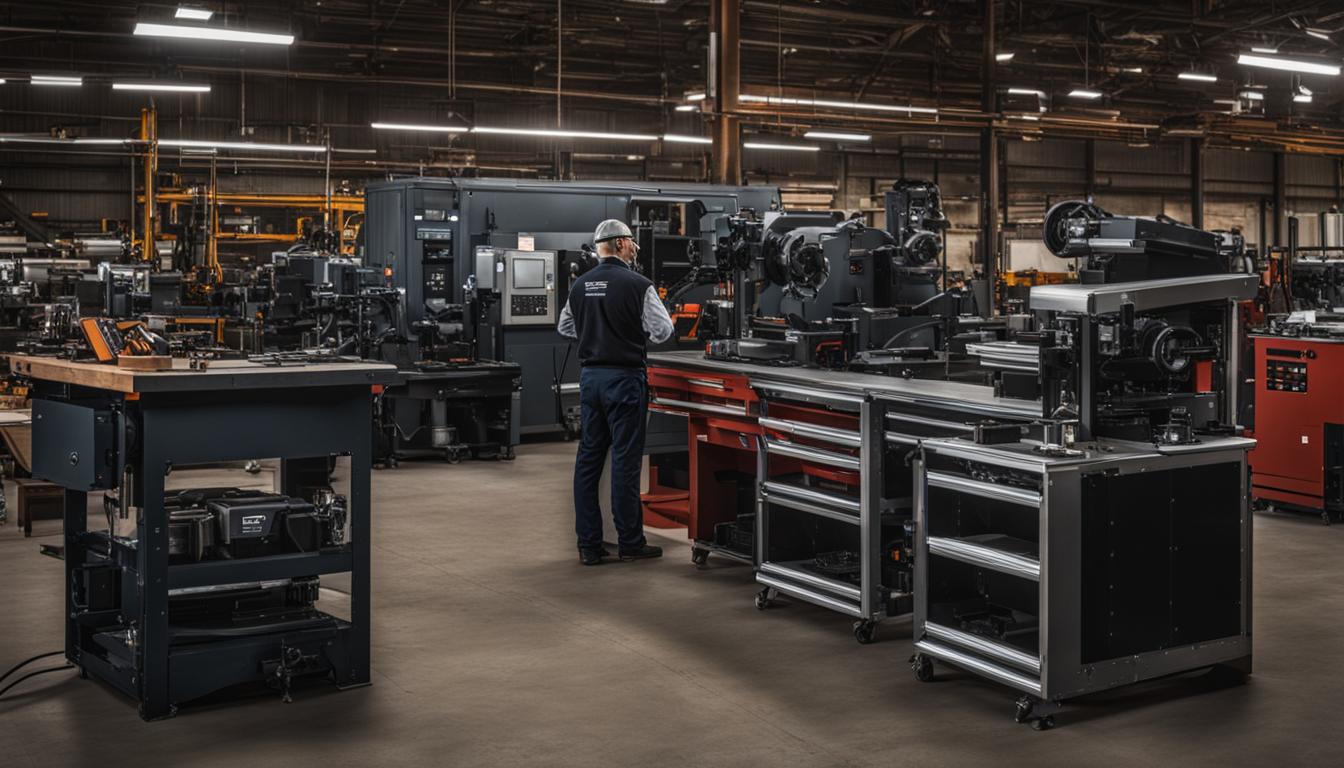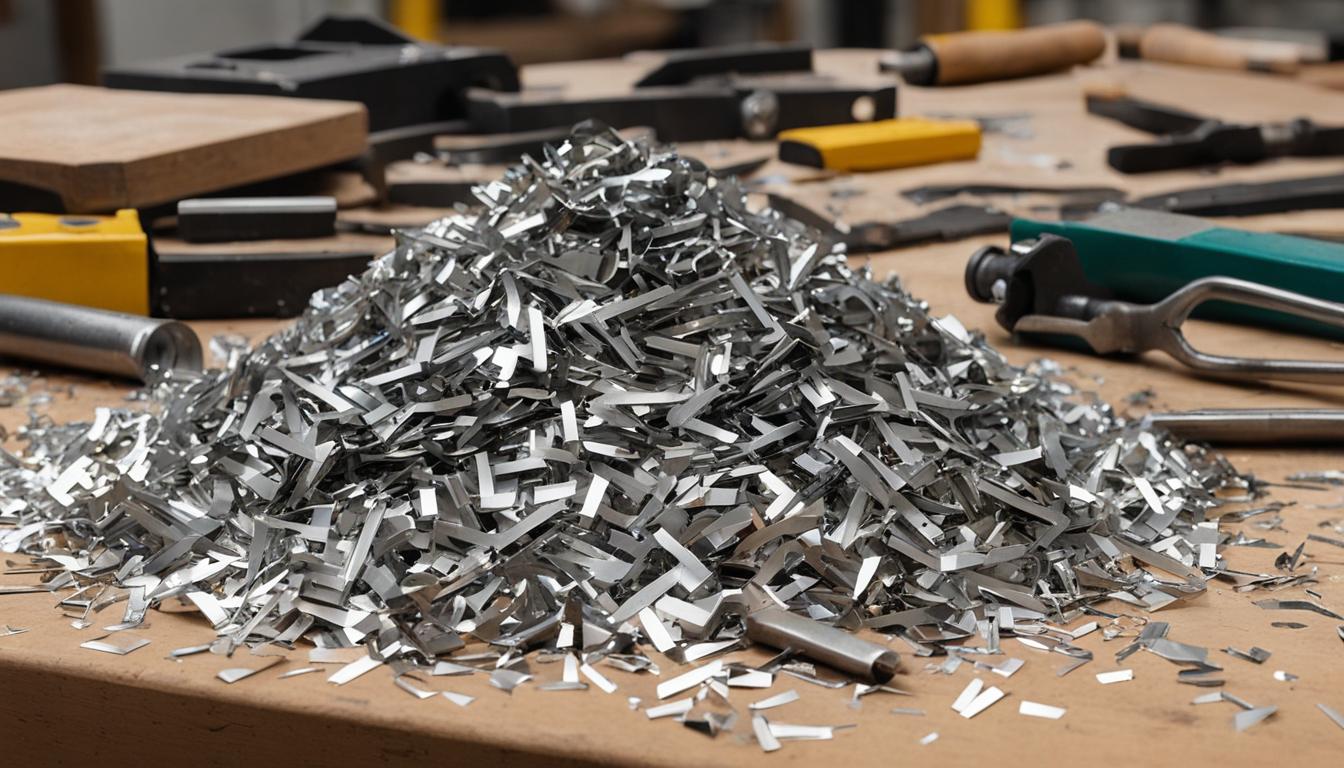When it comes to metal fabrication, choosing the right vendor for your cut off metal parts is a critical decision. The quality and reliability of your metal parts supplier can directly impact the efficiency and success of your operations. Whether you are in the automotive, aerospace, or any other industry that requires precision metal components, finding a vendor who can deliver the highest quality products is essential.
In this article, we will guide you through the process of selecting the best vendor for cut off metal parts. From evaluating their capabilities to assessing their experience and quality, we will cover all the factors you need to consider. We will also discuss the importance of metal fabrication services, understanding the equipment and technology used, and the significance of supplier development.
By the end of this article, you will have a clear understanding of what to look for in a vendor and how to make an informed decision. So let’s dive in and explore the key factors to consider when choosing a vendor for cut off metal parts.
Factors to Consider When Choosing a Vendor
When it comes to selecting a vendor for cut off metal parts, there are several key factors that you should take into consideration. These factors will help ensure that you choose a reliable and capable supplier who can meet your specific requirements. Below are some crucial factors to consider when evaluating potential vendors:
1. Precision Cutting and Metal Manufacturing Expertise
It is important to choose a vendor who specializes in precision cutting and metal manufacturing. Look for suppliers who have extensive experience in these areas and can provide the level of precision and quality that your project demands.
2. Industry-Specific Suppliers
Consider working with vendors who have experience in your specific industry. They will have a better understanding of your unique requirements and challenges, and are more likely to provide tailored solutions to meet your sourcing needs.
3. Metal Cutting Services
Assess the vendor’s capabilities in terms of metal cutting services. Look for suppliers who have a wide range of cutting options and equipment to handle different materials, thicknesses, and dimensions. This will ensure that they can provide the precise cutting services you need for your metal parts.
4. Metal Parts Sourcing
Ensure that the vendor has the ability to source the appropriate materials for your metal parts. They should have strong relationships with material suppliers and knowledge of different grades and specifications to meet your requirements.
5. Industry Reputation and Track Record
Take the time to research the vendor’s reputation within the industry. Look for testimonials and reviews from satisfied customers, and inquire about their track record of delivering high-quality products on time.
| Vendor Evaluation | Factors to Consider |
|---|---|
| Precision Cutting and Metal Manufacturing | Expertise in precision cutting and metal manufacturing |
| Industry-Specific Suppliers | Experience in your specific industry |
| Metal Cutting Services | Wide range of cutting options and equipment |
| Metal Parts Sourcing | Ability to source appropriate materials |
| Industry Reputation and Track Record | Positive reputation and track record of delivering high-quality products |
By considering these factors, you can make a more informed decision when selecting a vendor for your cut off metal parts sourcing and metal cutting services.
Assessing Vendor Capabilities
When evaluating potential vendors for cut off metal parts, it is essential to assess their capabilities in order to make an informed decision. Look for suppliers who have a proven track record of meeting stringent dimensional requirements and delivering accurate and repeatable results.
One crucial aspect to consider is the supplier’s ability to achieve high Cpk and Ppk values for narrow tolerance cutting. These statistical process control measures indicate the supplier’s capability to consistently produce parts within the specified limits, ensuring the dimensional accuracy of the final product.
Furthermore, inquire about the supplier’s complex metrology capabilities and expertise in working with different materials and part sizes. Evaluating their experience in cutting thin-walled tubes and composite materials without deformation or damage is also important.
In summary, assessing vendor capabilities involves considering their track record in meeting dimensional requirements, their ability to achieve accurate and repeatable results, and their expertise in working with different materials and part sizes.

Comparative Assessment of Vendor Capabilities
The table below compares the capabilities of three potential vendors based on specific criteria.
| Vendor | Dimensional Accuracy | Cpk & Ppk Values | Metrology Capabilities | Expertise with Materials | Thin-Walled Tube Cutting |
|---|---|---|---|---|---|
| Vendor A | Excellent | High | Advanced | Extensive | Experienced |
| Vendor B | Good | Moderate | Basic | Limited | Inexperienced |
| Vendor C | Excellent | High | Advanced | Extensive | Experienced |
Understanding Equipment and Technology
In the world of metal fabrication, the equipment and technology utilized by a vendor can make a significant difference in the quality and efficiency of the cutting process. When selecting a supplier for cut off metal parts, it is essential to consider their cutting machines, which directly affect accuracy, tight tolerances, set-up time, and cost.
Advanced cutting machines are key to achieving precise and consistent results. Look for suppliers who invest in state-of-the-art equipment that can increase accuracy, while also offering the flexibility to customize the cutting process according to your specific needs.
Consider the following features when evaluating cutting machines:
- Programmable Operating Controls: These enable precise control over the cutting process, allowing for accurate and repeatable results.
- Computerized Cutting Speeds and Feeds: These automated features optimize the cutting parameters to achieve the desired accuracy and efficiency.
- Capabilities for Maintaining Tight Tolerances: Cutting machines with built-in mechanisms for holding tight tolerances ensure that the finished parts meet the required specifications.
By partnering with a vendor who has cutting-edge equipment, you can benefit from increased accuracy, minimal rework, and reduced wastage, ultimately improving your overall production efficiency.
Moreover, the vendor’s ability to handle different part sizes and materials plays a crucial role in meeting your specific requirements and reducing set-up time and cost. A versatile vendor can accommodate a wide range of part sizes, from small intricate components to large-scale structures. The ability to work with various materials, including non-ferrous metals, ferrous alloys, and specialty metals, allows for greater flexibility in sourcing and production.
In summary, when choosing a vendor for cut off metal parts, it is imperative to consider their cutting machines and the associated technology. The use of advanced equipment can greatly enhance accuracy, tight tolerances, and operational efficiency. Furthermore, a vendor’s ability to handle diverse part sizes and materials can contribute to reduced set-up time and cost. Partnering with a supplier who prioritizes investment in cutting-edge equipment will ensure that your metal fabrication needs are met with precision and cost-effectiveness.
Importance of Metal Fabrication Services
Metal fabrication services are essential in the manufacturing process as they enable the production of precision parts with high levels of accuracy through custom design. This is particularly significant for industries like automotive, aerospace, and marine that often require custom components. When selecting a vendor for metal fabrication, it is important to consider their range of capabilities in order to meet your specific requirements. Look for vendors that offer a wide array of metal fabrication services such as cutting, stamping, forming, bending, and assembling.
One key consideration when evaluating vendors is their ability to provide value-added services that enhance the quality and functionality of the components. These services may include techniques like welding, plating, heat treating, and coating, which can further enhance the performance and durability of the parts being fabricated.
To better illustrate the importance of metal fabrication services, here is a table outlining some of the primary services typically offered by metal fabrication vendors:
| Metal Fabrication Service | Description |
|---|---|
| Cutting | Precise cutting of metal sheets or bars to desired dimensions using various methods such as laser cutting or plasma cutting. |
| Stamping | Creating complex shapes or patterns on metal sheets using specialized stamping techniques and dies. |
| Forming | Shaping metal sheets into desired forms, such as bending, folding, or rolling, to achieve specific geometries. |
| Bending | Precision bending of metal components to create angles, curves, or configurations required for assembly. |
| Assembling | Joining fabricated metal components together through techniques like welding, fastening, or adhesive bonding. |
Custom Design and Precision Levels
A significant advantage of metal fabrication services is the ability to create custom-designed parts according to specific requirements. This enables manufacturers to meet unique design needs and tailor components to fit seamlessly within their products. Whether it’s intricate and complex geometries or large-scale structures, metal fabrication can accommodate diverse design intents, providing manufacturers with flexibility and innovation.
Additionally, metal fabrication services ensure high precision levels in the production process. With advanced technologies and skilled craftsmen, metal fabricators can achieve tight tolerances, ensuring consistent quality and dimensional accuracy across the fabricated components. This precision is vital in industries where precise fit and functionality are critical, such as in aerospace and medical devices.
To summarize, metal fabrication services offer custom design capabilities and precision levels that are essential for manufacturing industries. By partnering with a reputable metal fabrication vendor, manufacturers can obtain high-quality, custom components that meet their specific requirements and contribute to the overall success of their products.
Evaluating Vendor Experience and Quality
When choosing a metal fabrication vendor, experience and quality are crucial factors to consider. A vendor with extensive experience in the industry is more likely to have the knowledge and expertise needed to deliver exceptional results. Look for vendors who have been in business for a significant period and have successfully completed projects similar to yours.
Another important aspect to evaluate is the quality of their work. Quality refers to the level of excellence in the products and services provided by the vendor. High-quality metal fabrication ensures that the parts produced meet the required specifications and perform optimally.
Certifications
One way to assess a vendor’s experience and commitment to quality is by examining their certifications. Certifications demonstrate that the vendor has met specific industry standards and has undergone rigorous evaluation processes. Look for certifications relevant to your industry or specific project requirements.
References
References provide valuable insights into a vendor’s past performance. Reach out to their previous customers and ask about their experience working with the vendor. Inquire about the quality of the products, adherence to deadlines, and overall satisfaction with the vendor’s services.
Continuous Improvement
Efficiency and continuous improvement are indicators of a high-quality vendor. A commitment to constantly refining their processes and enhancing efficiency indicates that the vendor strives for excellence. Inquire about their continuous improvement efforts and any initiatives they have implemented to enhance their operations.

| Vendor | Years of Experience | Certifications | Customer References | Continuous Improvement Initiatives |
|---|---|---|---|---|
| Vendor A | 15 | ISO 9001, AS9100 | Positive reviews from automotive and aerospace industry | Lean Six Sigma implementation |
| Vendor B | 10 | ISO 9001 | Mixed reviews from various industries | Regular employee training programs |
| Vendor C | 25 | ISO 9001, ISO 13485 | Highly recommended by medical device manufacturers | Investment in advanced machining technology |
Assessing Supplier Capability
When selecting a metal fabrication supplier, assessing their capability is crucial in ensuring a successful partnership. Evaluating their range of capabilities and expertise in handling various materials is essential to meet your business needs without any production issues. Furthermore, considering their production services and design capabilities can provide valuable insights into their ability to deliver high-quality products.
Here are important aspects to evaluate when assessing a supplier’s capability:
1. Materials
Consider the types of materials the supplier works with and their level of expertise in handling those materials. Whether it’s steel, aluminum, or specialty metals, ensure that the supplier has the necessary knowledge and experience to meet your specific material requirements. This ensures the production of strong, durable, and high-quality metal parts.
2. Production Services
Assess the supplier’s production services to determine their capabilities in delivering finished products. Look for services such as finishing machining, assembly, and testing. Reliable suppliers offer comprehensive production services to streamline the manufacturing process and deliver fully functional metal parts that meet your specifications.
3. Design Services
Inquire about the supplier’s design capabilities, especially if your project requires design services from the supplier. A supplier with strong design expertise can provide valuable insights and suggestions to optimize the design of your metal parts for better functionality and efficiency. Their design services can help ensure that the final product meets your expectations and requirements.
By thoroughly assessing a supplier’s capability in handling materials, production services, and design services, you can choose a supplier that aligns with your business needs and offers the necessary expertise for successful metal fabrication.
Supplier Capability Assessment
| Supplier Capability | Assessment Criteria |
|---|---|
| Materials | Types of materials handled Expertise in specific materials |
| Production Services | Finishing machining Assembly capabilities Testing capabilities |
| Design Services | Capability to provide design services Expertise in design optimization |
Assessing supplier capability ensures that you choose a metal fabrication partner who can meet your specific needs, from material selection to the delivery of finished products. By partnering with a capable supplier, you can expect excellent results and a smooth manufacturing process.
Considering Costs and Pricing
When choosing a metal fabrication vendor, it’s important to consider more than just costs and pricing. While budget is a significant factor, it should not be the sole determining factor in your decision-making process. It’s essential to evaluate the overall capabilities, experience, and quality of the supplier to ensure they can meet your specific needs.
Obtaining quotes from multiple vendors is a prudent approach to compare costs. However, it’s crucial to take into account the specific requirements of your program. What may appear as favorable pricing initially might not include all the necessary components or additional costs such as tooling.
Before finalizing a vendor, it is vital to have a clear understanding of the program costs. This includes any potential tooling costs or customization charges that may apply to your project. Make sure to request detailed breakdowns of pricing and inquire about any possible hidden fees.
Remember, the decision should ultimately be based on the overall value the vendor provides, which includes their capabilities, experience, and quality standards, along with the cost and pricing aspect. Prioritizing long-term partnership potential and the supplier’s ability to consistently deliver high-quality products and services is essential for the success of your project.
Emphasizing Supplier Development Process
Implementing a supplier development process is crucial for selecting the right metal fabrication vendor. By developing clear selection criteria that go beyond cost reduction, you can prioritize capabilities, experience, and quality. Collaborating with potential vendors is essential to ensure that their capabilities align with your specific requirements.
One of the key criteria to emphasize is efficiency. An efficient supplier will not only deliver products on time but also optimize operational processes, leading to increased productivity and cost savings.
To promote efficiency, focus on suppliers that demonstrate a commitment to continuous improvement in their operations. Look for vendors who invest in technology and automation, as these factors contribute to enhanced efficiency in the fabrication process.
Additionally, it is essential to establish strong communication channels with the chosen vendor. Effective communication plays a vital role in fostering a productive and collaborative relationship. By maintaining open lines of communication, you can address any concerns or potential issues promptly, leading to improved efficiency and overall project success.
Example Criteria for Supplier Development Process
When developing the criteria for supplier selection, consider the following factors:
- Years of experience in metal fabrication
- Track record of delivering high-quality products
- Certifications and adherence to industry standards
- Commitment to continuous improvement and efficiency
- Investments in technology and automation
- Availability of advanced equipment for precision cutting
- Ability to handle varying order volumes
- Positive references from past customers
By emphasizing the supplier development process and considering these criteria, you can select a vendor that not only meets your specific requirements but also adds value to your business in terms of efficiency and long-term partnership potential.
Conclusion
Choosing the right vendor for cut off metal parts is essential for ensuring the quality and efficiency of your operations. To make a well-informed decision, consider various factors such as the vendor’s capabilities, experience, and commitment to delivering high-quality products. Assess their equipment and technology to ensure they are equipped to handle your specific requirements.
Additionally, evaluate the vendor’s ability to provide metal fabrication services and design capabilities. This includes their expertise in cutting a variety of materials and their proficiency in producing precise and burr-free parts with tight tolerances.
While cost is an important consideration, it should not be the sole determining factor. Prioritize overall value and long-term partnership potential, taking into account the vendor’s track record, certifications, and references. By following a rigorous supplier development process and considering these key factors, you can choose the best vendor for your cut off metal parts, ensuring a successful and efficient manufacturing process.
